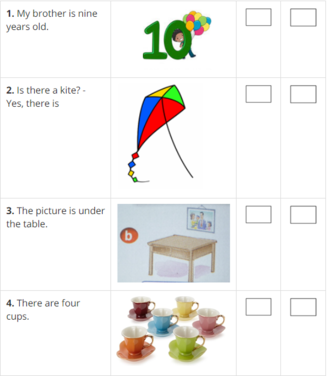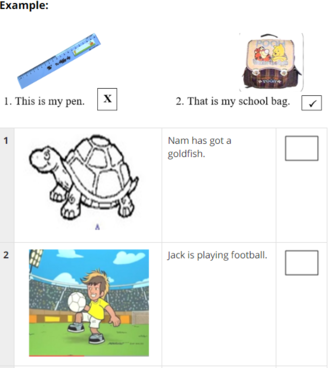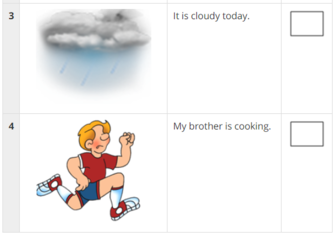Look and read. Put a tick (√) or a cross (x).

Look and read. Put a tick (√ : TRUE) or cross (x: FASLE) in the box.


I. Read the article about living like people sixty years ago and say if the sentences are True (T), False (F) or Doesn’t say (?). Put a cross (X) in the correct place in the table.
| Sentences | T | F | ? |
1 | The family lived like people in the nineteenth century. |
|
|
|
2 | They stayed in the house for two weeks. |
|
|
|
3 | Emily hated the TV programmes because they were black and white. |
|
|
|
4 | Emily watched a lot of comedy programmes. |
|
|
|
5 | Emily’s favourite part of the experience was going to school. |
|
|
|
6 | Emily loved the food because the ingredients were all fresh. |
|
|
|
7 | Emily thought that the fast food they ate was delicious. |
|
|
|
Life in a Nineteen-Fifties House
As part of a recent TV programme, a twenty-first-century family spent two weeks living in the same way as people in the 1950s. One month after filming in the specially designed house finished, we talk to Emily, one of the children, about her experience.
Q: What was the most difficult part of the experience?
A: I think it was the TV. I know it sounds strange, but the TV was very small and the picture was black and white, not colour. I didn’t mind that, really – I didn’t notice it after a while, but the programmes themselves weren’t great. Compared to today’s shows, they seemed very boring. My dad watched loads of the comedy shows and loved them. They didn’t seem very funny to me.
Q: And what about the best thing?
A: The school was fun and it seemed easier than my normal school, but I suppose what was most enjoyable was the food! I know that Mum and Dad had to spend a lot of time making it, but what we ate was so healthy. We had very little fast food, just a few chips, and there was no tinned or frozen food either, really. I felt so good after eating it.
I. Read the article and decide if the sentences below are True or False. Put a cross (X) in the correct place in the table.
| TRUE | FALSE |
1 Astronauts have ten years of training before they go into space. |
|
|
2 Astronauts practise in real space ships. |
|
|
3 Working in a swimming pool is a bit like working in space. |
|
|
4 All astronauts have to learn Japanese. |
|
|
5 The trainee astronaut likes cycling. |
|
|
6 Trainee astronauts have to live in many different places. |
|
|
A day in the life of a trainee astronaut
It can take up to two years to train to be an astronaut. After training, some astronauts wait for ten years before they make their first trip into space. So what’s life like as a trainee astronaut? Well, we asked one!
‘We all learn how to use and take care of the complex equipment we use, so we have many classes. These happen in a classroom, in machines that are a bit like real space ships, and in the swimming pool. The swimming pool is very similar to being in space because you weigh much less in water!
‘We also have to have language classes. My first language is Japanese, but I have to learn English and Russian too, so I can talk to the ground crew. I have to be very fit so I exercise for about three hours a day. Many of my colleagues go running together, but I prefer cycling on my own.
‘There are training centres in Germany, Russia, Japan and the USA and we spend time at all of them. I hope one day I can make it into space.’
II. Read the magazine article and choose the correct answer (A, B or C).
1 Johnny Depp’s home is in ……..
A France. B Kentucky. C Los Angeles.
2 Johnny is……
A tall. B slim. C quiet.
3 Jack Sparrow’s hair is
A brown. B white. C black.
4 Edward Scissorhands is
A friendly. B brave. C nervous.
5 Edward Scissorhands has the same colour
A eyes as Johnny. B hair as Johnny. C skin as Johnny.
6 The Mad Hatter
A has orange eyes and green hair. B has orange hair and is American.
C has green eyes and is Scottish.
I. Read the article and decide if the sentences below are True or False. Put a cross (X) in the correct place in the table.
| TRUE | FALSE |
1 Astronauts have ten years of training before they go into space. |
| X |
2 Astronauts practise in real space ships. |
| X |
3 Working in a swimming pool is a bit like working in space. | X |
|
4 All astronauts have to learn Japanese. | X |
|
5 The trainee astronaut likes cycling. |
| X |
6 Trainee astronauts have to live in many different places. | X |
|
( Bài 2 bạn không gửi đoạn văn thì mình không làm được nha )
Put a tick (√) if the relative pronoun can be omitted. If not, put a cross (x).
……1. The woman who I saw was American.
……2. Look at the animal whose tail is so short.
……3. He is the man to whom this place belongs.
……4. The smoke which you see is from the hills.
……5. They are the people on whom you can rely.
……6. It’s Mr. Harrison who teaches us this subject.
……7. These are the documents that I’ve been looking for.
……8. She is the most charming woman that I’ve ever seen.
……9. She’s the girl whose pet has been missing for two days.
……10. Ho Chi Minh, who was born in Nghe An, is a great leader.
……11. The company which made this product is very well – known.
……12. These books are the only things of which the old man takes care.
……13. The newspaper that my father is reading doesn’t interest me at all.
……14. The little house which is located on the coast over there is very nice.
……15. The natural disasters which are called “Tidal Waves” often occur suddenly.
* Put a tick (√) if the relative pronoun can be omitted. If not, put a cross (x).
……1. The woman who I saw was American.
……2. Look at the animal whose tail is so short.
……3. He is the man to whom this place belongs.
……4. The smoke which you see is from the hills.
……5. They are the people on whom you can rely.
……6. It’s Mr. Harrison who teaches us this subject.
……7. These are the documents that I’ve been looking for.
……8. She is the most charming woman that I’ve ever seen.
……9. She’s the girl whose pet has been missing for two days.
……10. Ho Chi Minh, who was born in Nghe An, is a great leader.
……11. The company which made this product is very well – known.
……12. These books are the only things of which the old man takes care.
……13. The newspaper that my father is reading doesn’t interest me at all.
……14. The little house which is located on the coast over there is very nice.
……15. The natural disasters which are called “Tidal Waves” often occur suddenly
1 V
2 X
3 X
4 V
5 X
6 X
7 V
8 V
9 X
10 X
11 V
12 X
13 V
14 V
15 V
put a tick √ if the relative pronoun in the following sentence can be deleted, and put a cross X if is not ( chữa câu sai giúp mik luôn ak)
1. We lit a fire, which son dried out our clothes.
2. The report which son should have taken an hour and a half, took three hours.
3. The children who I was looking after were terrbly spoilt.
4. She thanked him for the kind help that she recevied.
5. There wasn't any directory in the telephone box from which I was phoning.
6. The man who was driving us didn't know the way.
7. The Smiths, whose house was destroyed in the explosion, were given rooms in the hotel.
8. The car which we hired from the airport broke down on the road.
9. My boss, who I really wanted to see, was too busy to meet anyone.
10. Mr. and Mrs.Jones, who were out playing cards, knew nothing of the burglary.
1. We lit a fire, which son dried out our clothes. (X)
Corrected: We lit a fire, which dried out our clothes.
2. The report which son should have taken an hour and a half, took three hours. (√)
3. The children who I was looking after were terribly spoilt. (√)
4. She thanked him for the kind help that she received. (X)
The relative pronoun "that" cannot be deleted in this sentence, so a cross (X) is appropriate.
5. There wasn't any directory in the telephone box from which I was phoning. (√)
6. The man who was driving us didn't know the way. (√)
7. The Smiths, whose house was destroyed in the explosion, were given rooms in the hotel. (√)
8. The car which we hired from the airport broke down on the road. (√)
9. My boss, who I really wanted to see, was too busy to meet anyone. (X)
The relative pronoun "who" cannot be deleted in this sentence, so a cross (X) is appropriate.
10. Mr. and Mrs. Jones, who were out playing cards, knew nothing of the burglary. (√)
Question 5: a/ Read the following passage and look carefully at each line. If a line is correct, put a tick (√ ). If a line has a word which should not be there, underline the word and write it in the space provided.
A recent investigation carry by scientists at the U.S. Geological survey shows | 1 |
that strange animal behavior might help predict future earthquakes. | 2 |
Investigators found such a occurrences in a ten-kilometer radius of the epicenter | 3 |
of a fairly recent quake. Some birds were screeched and flew about wildly, dogs | 4 |
yelped and ran around uncontrollably. Scientists believe that animals can be | 5 |
perceive these environmental changes as early as several days before the mishap. | 6 |
In 1976, after observing animal behavior, the Chinese were able to | 7 |
predict a devastating quake. Although many hundreds of thousands of people | 8 |
were killed, the government was able to evacuate millions of an other | 9 |
people and thus keep the death toll at a little lower level. | 10 |
Question 5: a/ Read the following passage and look carefully at each line. If a line is correct, put a tick (√ ). If a line has a word which should not be there, underline the word and write it in the space provided.
A recent investigation carry by scientists at the U.S. Geological survey shows | 1 |
that strange animal behavior might help predict future earthquakes. | 2 |
Investigators found such a occurrences in a ten-kilometer radius of the epicenter | 3 |
of a fairly recent quake. Some birds were screeched and flew about wildly, dogs | 4 |
yelped and ran around uncontrollably. Scientists believe that animals can be | 5 |
perceive these environmental changes as early as several days before the mishap. | 6 |
In 1976, after observing animal behavior, the Chinese were able to | 7 |
predict a devastating quake. Although many hundreds of thousands of people | 8 |
were killed, the government was able to evacuate millions of an other | 9 |
people and thus keep the death toll at a little lower level. | 10 |
Read the text below and look carefully at each line. Some of the lines are correct, and some have a word which should not be there. If a line is correct, put a tick (ü). If a line has a word which should not be there, write the word: ( Brain training)
Do you remember how at school certain subject seemed be impossible 0…be
to understand? However much the teacher tried to explain geography, 00…ü
for example, you still did not grasp even though the basics? Now some 1…ü
psychologists are suggesting that learning difficulties may be in the way 2……
the subjects are been presented rather than being a failure on the part 3……
of the children. According to a method that called NLP ( Don’t worry what 4……
the letters stand for now), people fall into groups depending on how they 5……
do learn best – through sight, sound or feeling. For example, a visual 6……
child will to learn best through diagrams, an auditory child through spoken 7……
words, while a kinesthetic child will benefit most from and practical 8……
examples. It is easy to find out at which group your child belongs to. 9……
All you have to do is ask him or her a question such as “ What was your 10…. .
day at school like?”. According to the new theory of NLP, the way the child 11……
will answers will tell you whether they learn through sight, sound or feeling. 12……
So, a visual child, when answering, will look up to your right, whereas 13……
an auditory child will look from left to right. A child that has learns best 14..…
through feeling will look down to the left and right before giving an answer. 15…..